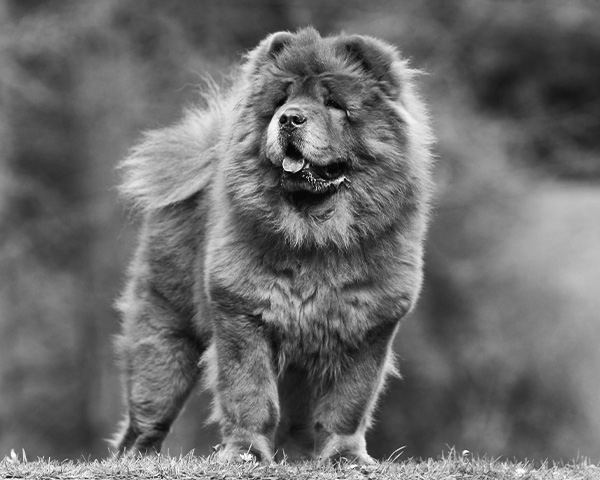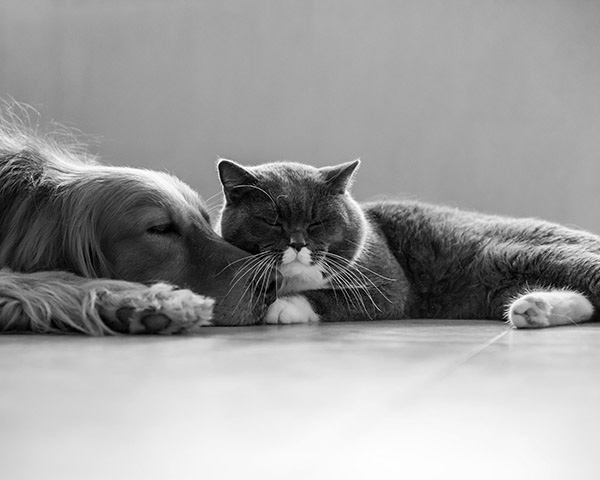Chow Chow breed information and advice
Chow Chow’s are one of the cutest breeds around. Learn how to best look after them, about the Chow Chow temperament, common health problems and more in this guide.
With fluffy fur, bear-like features and an infectious personality – there’s nothing not to love. Descending from ancient China, these gentle giants have a ruff around their necks that resembles a lion’s mane and a compact form.
The breed has a rich history dating back thousands of years to the Han dynasty (206 BCE to 220 CE). In fact, Chow Chow dogs are believed to be the oldest dog breed. Originally bred for guarding, hunting and pulling carts, the breed has now become popular as loyal companions.
Chow Chow dogs make great pets, are protective over their owners and build strong bonds. If you’re thinking about welcoming this cuddly bear into your home, this guide will inform you on everything you need to know about your new Chow Chow puppy – from training tips to grooming advice and much more.
Chow Chow facts

| Lifespan | 10 - 15 years |
| How much | £2,500 - £4,000 |
| Size | Medium, 18 to 22 inches tall at shoulder |
| Weight | 23 - 34 kgs |
| Colours | Chow Chow coats can be black, red, cream, cinnamon or blue |
| Grooming | Thick double coat which needs twice weekly brushing and regular baths |
| Temperament | Independent, loyal, aloof, can be stubborn and a challenge to train |
| Exercise | Up to an hour every day |
How to care for a Chow Chow
Chow Chow dogs are fairly low maintenance but still have moderate grooming and exercise needs. It’s important to understand all of their requirements so you can help them develop into a happy and healthy dog.
Feeding and nutrition
You need to make sure that your dog gets all their essential nutrients so that they can continue to be happy and healthy. Puppies have different needs to adult dogs – you can consult our puppy guide for more information.
Feed your Chow Chow dog a high-quality commercial dry or wet food option. There are also raw food diets to consider. With so many brands and types of food available, it can be hard to know what to pick. Your vet or breeder should be able to provide some recommendations on specific brands or types of food to try.
Give human food scraps sparingly – just because our food tastes good, that doesn’t mean it’s right for your pooch. You should always avoid cooked bones and high-fat foods.
Grooming
Chow Chow dogs have a luscious, thick coat that almost makes them look like a mini cuddly bear. They have a double coat and require regular brushing to prevent matting and keep them looking their best. Both rough and smooth-coated varieties need regular grooming.
You should bathe your Chow Chow every month and brush their coat at least twice a week. After a bath, use a cool air dryer to dry off your loveable pup. Make sure not to neglect eye and ear cleans and nail trims during the grooming process. Don’t forget the undercoat and make sure you brush and comb thoroughly to remove any mats.
While grooming your Chow Chow, keep a look out for any parasites and deal with them immediately. Treat fleas or ticks as soon as possible.
Exercise
Chow Chow dogs need around 45 to 60 minutes of exercise daily. This can be broken up into shorter walks spaced throughout the day. If you’re in a secured area, work up to letting them off the lead, so they can run around til their heart’s content discovering all sorts of interesting smells. Be careful not to over-exercise your puppy if they’re still growing and listen to the advice of your vet.
Training
Chow Chows are very independent, so training isn’t for the faint-hearted. You’ll need a whole lot of patience. Have lots of treats on hand, use positive reinforcement and go from there. Make sure you have high-value treats to reward your pup when they do the right thing.
Train Chow Chow dogs for short periods and set clear boundaries so they know what you expect of them. Chow Chows are known for being clean, so toilet training shouldn’t be too much of a struggle.
Temperament and behaviour
Chow Chows are free spirits. They are equally aloof and independent as they are fiercely loyal. This can make them a challenge to train, but they’re a joy to have as a loving pet. They’re intelligent and have very good manners.
Chow Chow dogs may not be the cuddliest breed, but if socialised well they are typically good with children and are protective of their family.
The Chow Chow temperament means they are wary of new people, and they often form attachments to just one person. They don’t particularly like adventures – so aren’t the best hiking partners.
Common health problems
Chow Chows are generally happy, healthy dogs, but they are prone to certain health conditions. They’re brachycephalic, meaning that they have a small upper jaw and a flat face. This makes them prone to respiratory conditions. Brachycephalic dogs are also at risk of heat stroke, as they can struggle to take in enough air to cool down.
Hip and elbow dysplasia
Chow Chows have a gaited walk, which puts pressure on the front half of their body. This in turn puts stress on their hip and elbow joints and can lead to dysplasia.
Hip dysplasia is caused by a deformed hip joint. It can lead to arthritis and gait abnormalities. Depending on how severe the condition is, your furry friend may need pain management treatment or surgery.
Similarly, elbow dysplasia is also caused by an elbow joint deformity. It’s more commonly seen in younger dogs if their elbows don’t fuse properly. It can progress into arthritis as the dog gets older.
Eye Problems
Brachycephalic breeds can suffer from eye problems. Their eyes tend to protrude more from their skulls, and it can be hard for their eyelids to completely close. Chow Chows also have a genetic predisposition to developing cataracts.
Other eye conditions to look out for include entropion – when the eyelid rolls inwards – and distichiasis – when eyelashes turn towards the eye and cause irritation. Chow Chows can also suffer from glaucoma, which can lead to blindness.
So, is a Chow Chow right for you?
There’s no denying that Chow Chow dogs are unbelievably cute. But are they the right dog for your circumstances? If you have lots of time to dedicate to training and socialising your Chow Chow, they could become your dream companion and most protective family friend.
Chow Chow insurance
Pet insurance can help to cover you and your Chow Chow for unexpected vet costs. Puppies can be mischievous – no matter the breed – so it’s best to be prepared with adequate dog insurance.
At Sainsbury’s Bank we offer time-limited, maximum benefit and lifetime policies, so you can choose the one that works best for your precious pooch. You could claim up to £10,000 towards vet costs per year depending on your policy and breed.
All insurance policies have restrictions. To find out more about our terms and conditions including exclusions, excesses and limits, please take a look at our policy documents.
Frequently asked questions
What is a Chow Chow?
A Chow Chow is a brachycephalic bread, with pointed ears and a flat face. They have a ruff around their head and a compact but powerful build. Loyal companions, Chow Chow dogs were traditionally bred as guard dogs.
Do Chow Chows shed?
Yes, Chow Chow dogs have a beautiful coat that is prone to shedding. They have a thick, double coat and will need more grooming in molting seasons – usually spring and autumn.
How big is a Chow Chow dog?
Chow Chow dogs are a medium-sized breed – but long hair varieties may look bigger. They measure between 18 and 22 inches up to their shoulders and weigh approximately 23 to 34 kilograms (48 to 75 pounds).

Browse our guides
Choose from our list of helpful guides and information

Explore dog breeds
Find out how to keep your dog healthy and happy

Cat breed guides
How to care for your cat, common health problems and more
Terms and conditions
Important information
*Guaranteed discount for Nectar members: The discount is based on information related to you and the transactions you've made with Sainsbury's supermarkets and Sainsbury's Bank using your Nectar card. For more information go to sainsburysbank.co.uk/nectar.
Sainsbury's Bank plc, Registered Office, 33 Holborn, London EC1N 2HT (registered in England and Wales, no. 3279730) is authorised by the Prudential Regulation Authority and regulated by the Financial Conduct Authority and the Prudential Regulation Authority (register no. 184514). Sainsbury's Supermarkets Ltd is an appointed representative of Sainsbury's Bank plc.
Sainsbury's Bank plc acts as an introducer to Pinnacle Insurance plc who is authorised by the Prudential Regulation Authority and regulated by the Financial Conduct Authority and the Prudential Regulation Authority (register number 110866). Registered Office: Pinnacle House, A1 Barnet Way, Borehamwood, Hertfordshire, WD6 2XX. Sainsbury’s Bank plc and Pinnacle Insurance plc are not part of the same corporate group.
